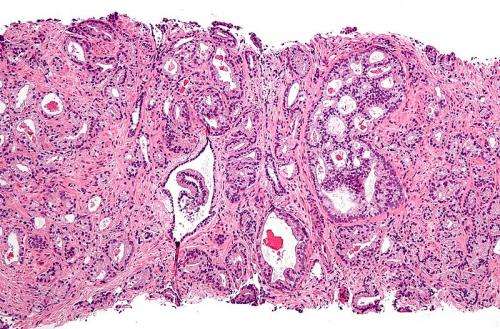PSA-based endpoints should not be used as surrogate endpoints for recurrent prostate cancer

Results from a surrogacy analysis of the NRG-RTOG 9601 trial indicated that biochemical failure was not an adequate surrogate endpoint for overall survival for patients with recurrent prostate cancer following prostatectomy. The analysis suggested that metastasis-free survival (MFS) should be considered the current, best surrogate endpoint for OS in this population. These findings were published in the Journal of Clinical Oncology.
"The Intermediate Clinical Endpoints in Cancer of the Prostate (ICECaP) working group previously indicated MFS is a valid surrogate for overall survival in men treated for localized prostate cancer, however, the analysis of NRG-RTOG 9601 was important in testing if this was the best surrogate for overall survival in men with recurrent prostate cancer after prostatectomy," stated William C. Jackson, MD, of the Department of Radiation Oncology at the University of Michigan and the Lead Author of the NRG-RTOG 9601 surrogacy analysis. "MFS should be considered the preferred surrogate for overall survival in this setting and this endpoint has the most potential to expedite future clinical trials that are studying salvage radiotherapy."
The initial NRG-RTOG 9601 clinical trial accrued 760 men with recurrent prostate cancer following prostatectomy and patients were randomly assigned to receive either salvage radiotherapy (SRT) with two years of placebo or to receive SRT with two years of daily bicalutamide. In total, 421 men experienced biochemical failure (PSA nadir+0.3-0.5 ng/mL, or initiation of salvage hormone therapy [BF1]), whereas 234 men met the BF2 definition (PSA nadir+2 ng/mL), and 483 men experienced BF3 (AUA definition: PSA of 0.2 ng/mL followed by a confirmatory value of 0.2 ng/mL or greater). One-hundred and fifty-six men developed distant metastases in the placebo treatment arm, and in total there were 239 deaths from any cause.
The surrogacy analysis used Prentice criteria and a two-stage meta-analytic approach to assess multiple intermediate clinical endpoints as possible surrogate endpoints for overall survival in men receiving salvage radiotherapy (RT) for their prostate cancer, including the definition of biochemical failure used in NRG-RTOG 9601, the definition of biochemical failure used in NRG-RTOG 0534, distant metastasis (DM), and MFS (DM or death).
All endpoints satisfied the Prentice criteria however, there was a strong correlation between MFS and OS (τ=0.86), in the meta-analytic approach when compared to the other endpoints (DM (τ=0.66), NRG-RTOG 9601 definition of biochemical failure(τ=0.25), and the NRG-RTOG 0534 definition of biochemical failure (τ=0.40)). The second condition, the correlation of treatment effect of antiandrogen therapy on the intermediate clinical endpoint and OS, also closely correlated MFS and OS (R^2=0.67), but not DM(R^2=0.18), the NRG-RTOG 9601 definition of biochemical failure (R^2=0.09), nor the NRG-RTOG 0534 definition of biochemical failure (R^2=0.12)].
More information: William C. Jackson et al, Biochemical Failure Is Not a Surrogate End Point for Overall Survival in Recurrent Prostate Cancer: Analysis of NRG Oncology/RTOG 9601, Journal of Clinical Oncology (2022). DOI: 10.1200/JCO.21.02741


















